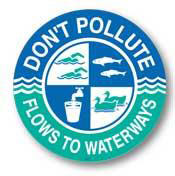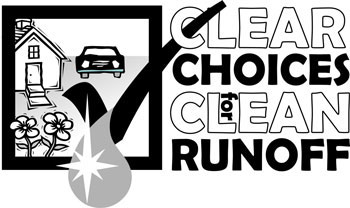Public Education
Effects of Stormwater Runoff

Polluted stormwater runoff can have many adverse effects on plants, fish, animals, and people.
Sediment can cloud the water and make it difficult or impossible for aquatic plants to grow. Sediment also can destroy aquatic habitats.
Excess nutrients can cause algae blooms. When algae die, they sink to the bottom and decompose in a process that removes oxygen from the water. Fish and other aquatic organisms can’t exist in water with low dissolved oxygen levels.
Bacteria and other pathogens can wash into swimming areas and create health hazards, often making beach closures necessary.
Debris—plastic bags, six-pack rings, bottles, and cigarette butts—washed into waterbodies can choke, suffocate, or disable aquatic life like ducks, fish, turtles, and birds.
Household hazardous wastes like insecticides, pesticides, paint, solvents, used motor oil, and other auto fluids can poison aquatic life. Land animals and people can become sick or die from eating diseased fish and shellfish or ingesting polluted water.
Polluted stormwater often affects drinking water sources. This, in turn, can affect human health and increase drinking water treatment costs.
Be the Solution to Runoff Pollution!

As stormwater flows over driveways, lawns, and sidewalks, it picks up debris, chemicals, dirt, and other pollutants. Stormwater can flow into a storm sewer system or directly to a lake, stream, river, wetland, or coastal water. Anything that enters a storm sewer system is discharged untreated into the waterbodies we use for swimming, fishing, and providing drinking water. Polluted runoff is the nation’s greatest threat to clean water.
By practicing healthy household habits, homeowners can keep common pollutants like pesticides, pet waste, grass clippings, and automotive fluids off the ground and out of stormwater. Adopt these healthy household habits and help protect lakes, streams, rivers, wetlands, and coastal waters. Remember to share the habits with your neighbors!
You can help by taking steps around the home to increase the amount of water that soaks into the ground. This reduces the amount of water flowing into the street. Here's how:
Wash your car on the lawn (not the driveway), or take your car to a commercial car wash
Plant lots of trees, shrubs, and ground cover
Use a rain barrel to catch and store water for gardens
Redirect down spouts from paved areas to vegetated areas
Install gravel trenches along driveways and patios
Use porous materials (i.e. wooden planks and bricks) for walkways and patios
Grade driveway and walkways to direct water flow toward vegetated areas
Download Londonderry Township's Plan for Public Education and Outreach
Revised 3/26/2024
Our Stormwater Program Pages
- Resources For Homeowners
- Resources For Farmers
- Resources For Students
- Chesapeake Bay Pollutant Reduction Plan
- Water Quality Projects in Londonderry
- Public Education
- Public Involvement
- Illicit Discharge Detection & Elimination
- Construction
- Post-Construction
- Pollution Prevention & Good Housekeeping
- Stormwater Management Ordinance (SWMO)
- Annual Report (~13mb)






 Boards &
Boards &